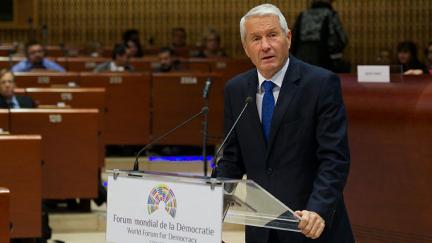News 2013

In his closing remarks to theStrasbourg World Forum for Democracy, Secretary General Thorbjørn Jagland highlighted the need to promote online literacy and raise awareness of the risks to privacy and data protection. Political parties and institutions had a huge potential to increase accountability and transparency on the internet.
Referring to the speech by the award-winning writer and intellectual Amin Maalouf, he emphasised that democracies need to protect the rights of minorities. "There is no true democracy without respect of universal human rights", he said.
Closing remarks by the Secretary General
Ladies and gentlemen, dear friends,
The Strasbourg World Forum for Democracy has been a truly exceptional experience. Some 1.400 participants from over 100 countries have come together to discuss the future of civic society and political participation.
The Forum has become a global platform for high-quality exchanges between citizens and activists – for all who want to build the democracies we live in. Also, the forum offers a unique opportunity especially for young citizens to have a voice in shaping democracy.
Finding new ways to reverse the trend of declining political participation has been a key theme of the Forum. Digital tools cannot and should not replace representative democracy, but they can make it more meaningful for many people.
The Council of Europe's future work on democracy will be guided by three priorities which have emerged from our discussions: engagement, transparency and the protection of human rights.
The Internet allows citizens to interconnect, to identify issues and rally for a common cause. And it has the potential to make democracy more inclusive.
We need to identify best practices which can raise citizens' interest in politics and political institutions. This, in turn, is a precondition for increasing voter turnout.
Effective engagement relies on education. We need to promote online literacy to make full use of digital technology. Knowing the risks to privacy is equally important.
In addition, parties and institutions have a huge potential to increase accountability and transparency on the internet.
Pursuing our pioneering work in the areas of data protection and fighting online hate speech, the Council of Europe is developing partnerships with governments and internet companies worldwide.
Speaking at the opening of the Forum, the award-winning writer and intellectual Amin Maalouf highlighted one of the most important challenges today: he said we have to ensure that democracy does not only allow decisions to be taken by majorities. Democracy must crucially protect the rights of minorities. There is no true democracy without respect of universal human rights.
This must remain our guiding principle as we develop our societies in the age of global interconnection.
On behalf of all at the Council of Europe, I would to thank you for your active participation in the Forum, and I am confident our collaboration will continue.


